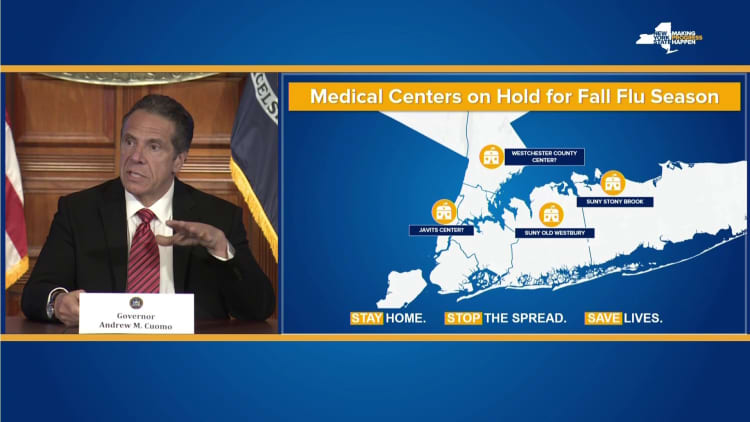
Gov. Andrew Cuomo said he spoke with President Donald Trump on Monday about keeping temporary health-care facilities in New York running in case the coronavirus flares up in a second wave later this year.
Cuomo's remarks come as health experts and political leaders, including those at the White House, warn that the coronavirus could persist through the fall and winter, and may be even more difficult to combat when flu season begins.
"We're now talking about the possibility of a second wave of the Covid virus or Covid combining with regular flu season in September, which could be problematic again for the hospital capacity," Cuomo said at a press conference in Albany.
"The facilities that were built, I spoke to the president about leaving them in place until we get through the flu season. God forbid we need extra capacity again," Cuomo said.
There are more confirmed cases of Covid-19 in the United States than in any other country: More than 972,000 infections and at least 55,000 deaths have been confirmed, according to data from Johns Hopkins University.
The outbreak, which originated about four months ago near the city of Wuhan in China's Hubei province, has prompted U.S. states to impose strict social distancing policies in an attempt to slow the spread of the disease. Those rules — closing nonessential businesses and ordering residents to stay home — have led to a devastating economic rout.
With the help of the U.S. Army Corps of Engineers, New York City quickly converted numerous buildings and areas into makeshift hospitals to help health-care workers from being overwhelmed by the flood of coronavirus patients.
The Jacob K. Javits Convention Center, located on the west side of Manhattan, was set up to accommodate 2,500 beds. The USNS Comfort was deployed to the city to serve as a hospital ship for patients who weren't infected with the virus. A pop-up facility created by Mt. Sinai Hospital provided 68 hospital beds in Central Park.
Cuomo said at the press conference that he did not want to have to "ask the federal government to build capacity, then take it down, and then wind up in another problem area."
"President Trump got it done, and he got it done very quickly," Cuomo added.
But the governor also noted the conflict in using a convention center as a hospital. "You can't reopen the convention center, obviously, with the hospital beds in it," he said.
Dozens of events listed on the Javits Center's website are still scheduled to be held later this year, including the New York Comic Con in October.
Current and former White House officials have recently warned that the coronavirus is unlikely to be defeated by the summer. Even Trump acknowledged that he may have to extend the White House social distancing guidelines, which are set to expire at the end of April.
"There's a real chance that come the fall, we have tools in place that we can mitigate small outbreaks and detect small outbreaks and we're not facing a constant risk of this infection," former Food and Drug Administration Commissioner Scott Gottlieb said Monday on CNBC's "Squawk Box."
"Or there's a chance that we never really get rid of the infection. It smolders through the summer and we come back in the fall and it sort of explodes into new large outbreaks and maybe even risk another epidemic," Gottlieb said.



